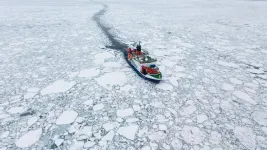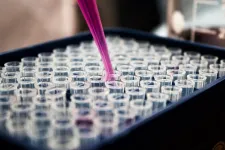INFORMATION:
The study was funded by the UK's Natural Environment Research Council, the European Space Agency (ESA), and the US National Aeronautics and Space Administration (NASA).
Arctic sea ice thinning faster than expected
Sea ice in the coastal regions of the Arctic may be thinning up to twice as fast as previously thought, according to a new modelling study led by UCL (University College London) researchers
2021-06-04
(Press-News.org) Sea ice in the coastal regions of the Arctic may be thinning up to twice as fast as previously thought, according to a new modelling study led by UCL researchers.
Sea ice thickness is inferred by measuring the height of the ice above the water, and this measurement is distorted by snow weighing the ice floe down. Scientists adjust for this using a map of snow depth in the Arctic that is decades out of date and does not account for climate change.
In the new study, published in the journal The Cryosphere, researchers swapped this map for the results of a new computer model designed to estimate snow depth as it varies year to year, and concluded that sea ice in key coastal regions was thinning at a rate that was 70% to 100% faster than previously thought.
Robbie Mallett (UCL Earth Sciences), the PhD student who led the study, said: "The thickness of sea ice is a sensitive indicator of the health of the Arctic. It is important as thicker ice acts as an insulating blanket, stopping the ocean from warming up the atmosphere in winter, and protecting the ocean from the sunshine in summer. Thinner ice is also less likely to survive during the Arctic summer melt."
"Previous calculations of sea ice thickness are based on a snow map last updated 20 years ago. Because sea ice has begun forming later and later in the year, the snow on top has less time to accumulate. Our calculations account for this declining snow depth for the first time, and suggest the sea ice is thinning faster than we thought."
Co-author Professor Julienne Stroeve (UCL Earth Sciences) said: "There are a number of uncertainties in measuring sea ice thickness but we believe our new calculations are a major step forward in terms of more accurately interpreting the data we have from satellites.
"We hope this work can be used to better assess the performance of climate models that forecast the effects of long-term climate change in the Arctic - a region that is warming at three times the global rate, and whose millions of square kilometres of ice are essential for keeping the planet cool."
To calculate sea ice thickness researchers used radar from the European Space Agency's CryoSat-2 satellite. By timing how long it takes for radar waves to bounce back from the ice, they can calculate the height of the ice above the water, from which they can infer the ice's total thickness.
In the new study, researchers used a novel snow model previously developed by researchers at UCL and Colorado State University, SnowModel-LG, which calculates snow depth and density using inputs such as air temperature, snowfall and ice motion data to track how much snow accumulates on sea ice as it moves around the Arctic Ocean. By combining the results of the snow model with satellite radar observations, they then estimated the overall rate of decline of sea ice thickness in the Arctic, as well as the variability of sea ice thickness from year to year.
They found that the rate of decline in the three coastal seas of Laptev, Kara and Chukchi seas increased by 70%, 98% and 110% respectively, when compared to earlier calculations. They also found that, across all seven coastal seas, the variability in sea ice thickness from year to year increased by 58%.
Sea ice in the coastal seas typically varies from half a metre to two metres thick. Increasingly, the ice in this region is not surviving the summer melt. The faster thinning of sea ice in the coastal Arctic seas has implications for human activity in the region, both in terms of shipping along the Northern Sea Route for a larger part of the year, as well as the extraction of resources from the sea floor such as oil, gas and minerals.
Mallett said: "More ships following the route around Siberia would reduce the fuel and carbon emissions necessary to move goods around the world, particularly between China and Europe. However, it also raises the risk of fuel spillages in the Arctic, the consequences of which could be dire. The thinning of coastal sea ice is also worrying for indigenous communities, as it leaves settlements on the coast increasingly exposed to strong weather and wave action from the emerging ocean."
Mallett, Professor Stroeve and co-author Dr Michel Tsamados (UCL Earth Sciences) spent several weeks investigating snow and ice in the Arctic onboard the German research vessel Polarstern, which explored the central Arctic Ocean in 2019 and 2020.
ELSE PRESS RELEASES FROM THIS DATE:
Anxieties about side-effects and perceived trial uncertainties driving vaccine hesitancy
2021-06-04
Concerns about side effects and whether vaccines have been through enough testing are holding people back from getting vaccinated against COVID-19, according to a new report.
Data from an international survey of 15 countries* which ran between March and May this year showed that these were the most commonly cited reasons for not having had a coronavirus vaccine yet, in addition to not being eligible for one. Respondents' other commonly reported reasons included concerns about not getting the vaccine they would prefer, and worries over whether the vaccines are effective enough.
Led by Imperial College London's Institute of Global Health Innovation in collaboration with YouGov, the survey also looked at trust in COVID-19 vaccines. ...
Many COVID-19 patients produce immune responses against their body's tissues or organs
2021-06-04
A University of Birmingham-led study funded by the UK Coronavirus Immunology Consortium has found that many patients with COVID-19 produce immune responses against their body's own tissues or organs.
COVID-19 has been associated with a variety of unexpected symptoms, both at the time of infection and for many months afterwards. It is not fully understand what causes these symptoms, but one of the possibilities is that COVID-19 is triggering an autoimmune process where the immune system is misdirected to attack itself.
The study, published today (June 4) in the journal Clinical & Experimental Immunology, investigated the frequency and types of common ...
Prior COVID-19 infection reduces infection risk for up to 10 months
2021-06-04
Under embargo until Thursday 3 June, 23:30 UK time / 18:30 US Eastern time
Peer-reviewed observational study in people
Prior Covid-19 infection reduces infection risk for up to 10 months
The risk of being infected with SARS-CoV-2, the virus that causes Covid-19, is substantially reduced for up to 10 months following a first infection, according to new findings from the Vivaldi study led by UCL researchers.
For the study, published in Lancet Healthy Longevity, researchers looked at rates of Covid-19 infections between October and February among more than 2,000 care home residents and staff, comparing those who had evidence of a previous infection up to 10 months earlier, as determined by antibody testing, with those who had ...
Pfizer-BioNTech vaccine recipients have lower antibody levels targeting the Delta variant
2021-06-04
Levels of antibodies in the blood of vaccinated people that are able to recognise and fight the new SARS-CoV-2 Delta variant first discovered in India (B.1.617.2) are on average lower than those against previously circulating variants in the UK, according to new laboratory data from the Francis Crick Institute and the National Institute for Health Research (NIHR) UCLH Biomedical Research Centre, published today (Thursday) as a Research letter in The Lancet.
The results also show that levels of these antibodies are lower with increasing age and that levels decline over time, providing additional evidence in support of plans to deliver a vaccination boost to vulnerable people in the Autumn. ...
Immunotherapy drug delays recurrence in kidney cancer patients
2021-06-04
An immunotherapy drug given after surgery improved disease-free survival rates in patients with kidney cancer at high risk of relapse.
Interim results of a phase 3 trial of adjuvant therapy revealed a 32% decrease in the risk of recurrence or death with pembrolizumab compared with a placebo
This is the first positive study of immunotherapy in patients with kidney cancer at high risk of relapse.
BOSTON -- Treatment with an immunotherapy drug following kidney cancer surgery, prolonged disease-free survival rates in patients at high risk for recurrence, according to an interim ...
Genetic base editing treats sickle cell disease in mice
2021-06-03
Sickle cell disease (SCD) is the most common deadly genetic disorder, affecting more than 300,000 newborns worldwide each year. It leads to chronic pain, organ failure, and early death in patients. A team led by researchers at the Broad Institute of MIT and Harvard and St. Jude Children's Research Hospital has now demonstrated a base editing approach that efficiently corrects the mutation underlying SCD in patient blood stem cells and in mice. This gene editing treatment rescued the disease symptoms in animal models, enabling the long-lasting production of healthy blood cells.
The root of SCD is two mutated copies of the hemoglobin gene, HBB, which cause red ...
Secret shopper study sheds light on barriers to opioid treatment for women
2021-06-03
After a 2020 Vanderbilt University Medical Center study showed women have a difficult time accessing treatment for opioid use disorder (OUD), investigators analyzed comments received from the study's participants to further shed light on barriers to care, which included everything from long on-hold times to difficult interactions with clinic receptionists during phone calls seeking appointments.
A "secret shopper" study published in JAMA Network Open in 2020 used trained actors trying to get into treatment for opioid use disorder in 10 U.S. states. More than 10,000 unique "patients" were randomly assigned to be pregnant or non-pregnant and have private or Medicaid-based insurance to assess differences ...
Athletic competition after COVID
2021-06-03
MEMPHIS, Tenn. - Cardiovascular imaging demonstrated no evidence of myocardial injury or myocarditis in athletes after COVID-19 infection, according to a research letter published in Circulation by Le Bonheur Children's Hospital and the University of Tennessee Health Science Center cardiologists. The screening and evaluation was conducted by the Le Bonheur Children's Heart Institute Sports Cardiology team, Benjamin S. Hendrickson, MD, Ranjit R. Philip, MD, and Ryan E. Stephens, NP-C, MBA, and Le Bonheur Director of Cardiac MRI Jason N. Johnson, MD, MHS. Researchers say this study confirms existing recommendations ...
Mockingbird song decoded
2021-06-03
The North American mockingbird is famous for its ability to imitate the song of other birds. But it doesn't just mimic its kindred species, it actually composes its own songs based on other birds' melodies. An interdisciplinary research team has now worked out how exactly the mockingbird constructs its imitations. The scientists determined that the birds follow similar musical rules as those found in human music, from Beethoven to Kendrick Lamar.
The song of the mockingbird is so complex that to investigate it required a joint effort of experts from very different fields. Neuroscientist Tina Roeske of the Max Planck Institute for Empirical Aesthetics, field biologist Dave Gammon of Elon University, ...
The dream team: Scientists find drug duo that may cure COVID-19 together
2021-06-03
COVID-19 continues to claim lives across the world and is infecting millions more. Although several vaccines have recently become available, making significant strides towards preventing COVID-19, what about the treatment of those who already have the infection? Vaccines aren't 100% effective, highlighting the need--now more than ever--for effective antiviral therapeutics. Moreover, some people can't receive vaccines due to health issues, and new variants of SARS-CoV-2, the virus that causes COVID-19, that can penetrate vaccine-conferred immunity, are being reported, indicating that we need to think beyond prevention.
Given this need, a team of researchers based in Japan, the US, and the UK launched a project to develop effective therapeutics. ...
LAST 30 PRESS RELEASES:
Study finds more parents saying ‘No’ to vitamin K, putting babies’ brains at risk
Scientists develop new gut health measure that tracks disease
Rice gene discovery could cut fertiliser use while protecting yields
Jumping ‘DNA parasites’ linked to early stages of tumour formation
Ultra-sensitive CAR T cells provide potential strategy to treat solid tumors
Early Neanderthal-Human interbreeding was strongly sex biased
North American bird declines are widespread and accelerating in agricultural hotspots
Researchers recommend strategies for improved genetic privacy legislation
How birds achieve sweet success
More sensitive cell therapy may be a HIT against solid cancers
Scientists map how aging reshapes cells across the entire mammalian body
Hotspots of accelerated bird decline linked to agricultural activity
How ancient attraction shaped the human genome
NJIT faculty named Senior Members of the National Academy of Inventors
App aids substance use recovery in vulnerable populations
College students nationwide received lifesaving education on sudden cardiac death
Oak Ridge National Laboratory launches the Next-Generation Data Centers Institute
Improved short-term sea level change predictions with better AI training
UAlbany researchers develop new laser technique to test mRNA-based therapeutics
New water-treatment system removes nitrogen, phosphorus from farm tile drainage
Major Canadian study finds strong link between cannabis, anxiety and depression
New discovery of younger Ediacaran biota
Lymphovenous bypass: Potential surgical treatment for Alzheimer's disease?
When safety starts with a text message
CSIC develops an antibody that protects immune system cells in vitro from a dangerous hospital-acquired bacterium
New study challenges assumptions behind Africa’s Green Revolution efforts and calls for farmer-centered development models
Immune cells link lactation to long-lasting health
Evolution: Ancient mosquitoes developed a taste for early hominins
Pickleball players’ reported use of protective eyewear
Changes in organ donation after circulatory death in the US
[Press-News.org] Arctic sea ice thinning faster than expectedSea ice in the coastal regions of the Arctic may be thinning up to twice as fast as previously thought, according to a new modelling study led by UCL (University College London) researchers




